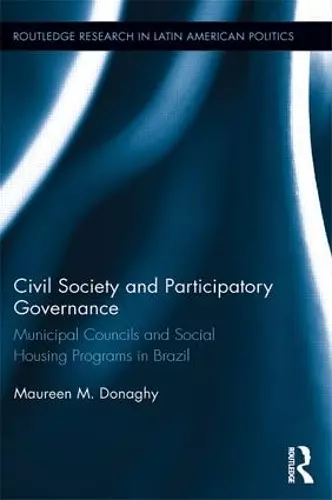Civil Society and Participatory Governance
Municipal Councils and Social Housing Programs in Brazil
Format:Paperback
Publisher:Taylor & Francis Ltd
Published:21st May '15
Currently unavailable, and unfortunately no date known when it will be back
This paperback is available in another edition too:
- Hardback£94.99(9780415629584)

Democratic institutions should promote accountability of government officials to the needs of citizens. Civil society plays a role in exposing corruption as well as in communicating the needs of low-income residents to officials. Neither the institutions of representative democracy nor the presence of civil society, however, appears to automatically guarantee adoption of social benefits for the poor. Can democratic institutions be created to address social challenges?
Scholars, development practitioners, donors, and activists propose participatory governance institutions as mechanisms to create accountability and responsiveness through a public forum incorporating civil society. To date, however, little comparative research exists to confirm whether these institutions do influence adoption of social policies. Maureen M. Donaghy remedies this gap by combining data from Brazil’s 5,564 municipalities with extensive fieldwork from five Brazilian cities to test whether participatory municipal housing councils are associated with an increase in adoption of social housing programs to benefit the poor. Housing represents an issue of critical importance in Brazil and other developing countries where large populations reside in informal settlements in unsafe and insecure conditions.
Civil Society and Participatory Governance is the first book of its kind to move the conversation beyond budgeting to other social policy areas, providing fresh theoretical and empirical insights to demonstrate that participatory governance institutions are effective mechanisms to coordinate government officials and civil society to alter policy-making.
"This book makes an important contribution to our understanding of how participatory governance can produce improvements in social well-being and public goods allocations. Donaghy’s work is a welcome addition to a growing body of work on citizen participation and participatory democracy, because it is the first book that combines large-N and case study analyses to demonstrate that these new democratic institutions generate public policies that have beneficial impacts on the lives of poor citizens."
—Brian Wampler, Boise State University
"This is an empirically rich and innovative "mixed-method" study of participatory institutions in Brazil. Donaghy does more than tell us that civic participation makes for good social policy. She presents a nuanced analysis of why that is so, breaking with commonly accepted hypotheses such as that a preexisting history of civil society mobilization determines the success of government sponsored efforts to include citizens in decision making."
—Rebecca Abers, University of Brasília
ISBN: 9781138915749
Dimensions: unknown
Weight: 317g
214 pages